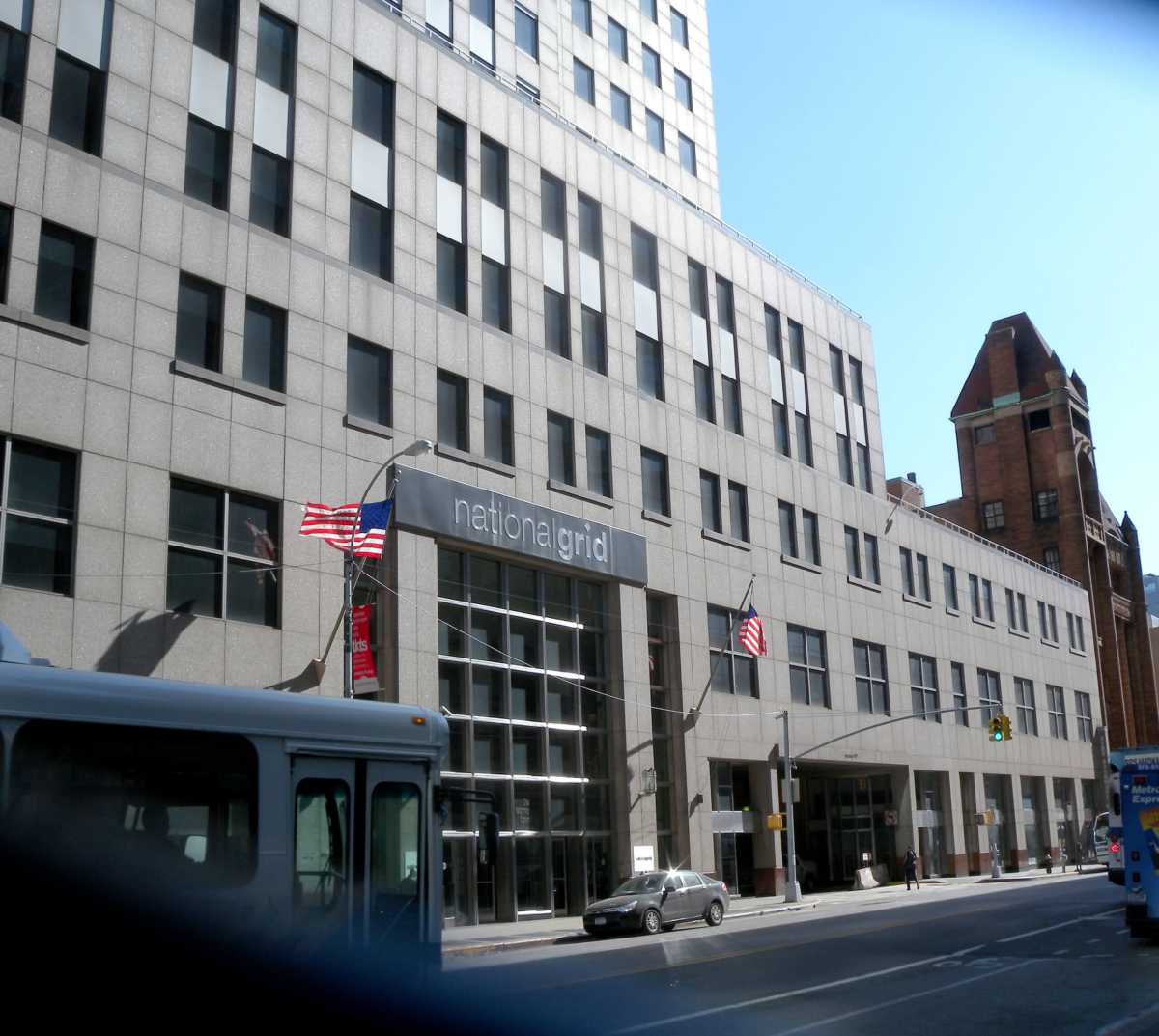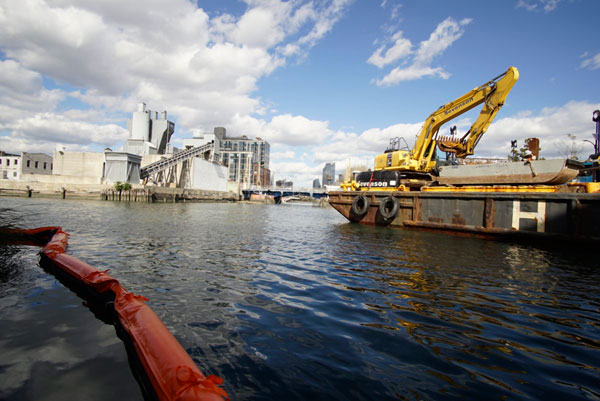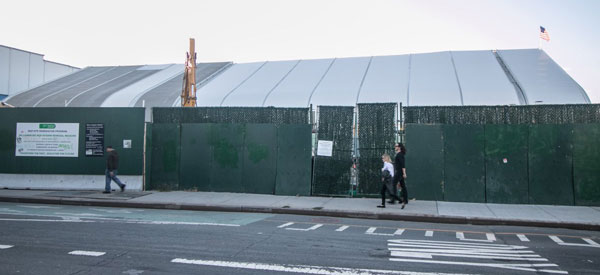Nearly 2 million National Grid customers will be paying more each month, as the utility company looks to recoup $129 million in construction costs for a controversial pipeline that will bring natural gas through northern Brooklyn.
The announcement adds salt to the wounds of local activists, who have vehemently opposed the pipeline — including by withholding utility payments to the company unless they abandoned the “racist” project that figures to run through predominantly Black and brown neighborhoods while adding toxic Co2 to the local air.
“We will not pay for National Grid’s racist, dirty, North Brooklyn fracked gas pipeline. We will not pay for our communities and our climate to be destroyed,” said Lee Ziesche, an organizer with the activist group Sane Energy Project, at a rally in June. “This is about decades of environmental racism.”
Now, the so-called Natural Gas Reliability Project will force local customers to pay more for their utility bills, after the state’s regulatory panel Public Service Commission voted Thursday to approve the rate hike that will see some customers in Brooklyn, Queens, and Staten Island charged approximately $66 more per year for two years.
The Sane Energy Project, an organization leading the fight against National Grid, said that around 300 people withholding their utility payments as part of the strike
“The joint proposal provides sufficient funding for the companies to maintain safe and reliable service while moderating rate impacts during the term of the rate plan,” said John B. Howard, chair of the PSC. “In addition, the joint proposal is consistent with our nation-leading clean energy initiatives, as well as our social and economic policies.”
Lincoln Restler, the Democratic nominee for City Council in northern Brooklyn’s 33rd District, blasted the idea of a new pipeline in New York, citing the increasing global temperatures, and calling on incoming-governor Kathy Hochul to take more significant measures to curb carbon emissions.
“Our planet cannot afford another pipeline and our community will not pay for it,” Restler said. “We need leadership from incoming Gov. Kathy Hochul to do right by both our environment and our neighborhoods.”
As part of the deal, National Grid agreed to halt the rate hike for a year, but that halt is retroactive — meaning many locals are already seeing a higher bill.
Roughly 1.2 million customers in Brooklyn, Queens, and Staten Island will see an increase of 3.8 percent in the second year and 3.3 percent in the third — raising their bills an average of $5.56 and $4.89 per month, respectively.
In a statement, the Public Service Commission said that the rate increase proposal they approved was “dramatically lower” than National Grid’s initial request, and requires that the company comply with the Climate Leadership and Protection Act, which seeks in part to reduce statewide greenhouse gas emissions by 40 percent from 1990 levels in the next decade.
Many activists, however, protested the expansion of long-term infrastructure that burns fossil fuels — a demand that has only become more salient since the United Nations released a damning report on the effects of climate change, and many city leaders have become more vocal about the potential ramifications for the Five Boroughs.
As a concession of the newly-reached agreement, National Grid will be required to stop marketing natural gas and provide their customers with information about alternative home-heating methods and the goals of the CLCPA.
“The goal is to have the utility sell less gas in the future, a clear-cut indication of what will happen at other gas utilities in New York as the CLCPA requirements take effect,” the commission said in a release.
The ruling also stated that CLCPA requirements will apply to all future rate increase requests. When reached by Brooklyn Paper, National Grid referred back to their press release, and did not provide further comment.
Some activists blasted the agreement, arguing that the company is not truly in compliance with the climate law.
“We’re pleased that the Commission agreed with us that the climate law does apply to rate cases, however we disagree that the joint proposal is compliant with that law,” said Jessica Azulay, Executive Director of Alliance for a Green Economy. “National Grid plans to keep increasing the amount of gas sold to its customers and is building dangerous and emitting infrastructure in disadvantaged communities to support that growth in sales. These two facts alone demonstrate violation of our climate law, which requires all state agencies to align their decisions with greenhouse gas reductions and avoid overburdening disadvantaged communities.”
The agreement halted construction of the last phase of the North Brooklyn Pipeline and does not include funding for that section, which is set to run through northern Brooklyn, according to the commission.
National Grid will need to meet requirements on “demand-reducing” initiatives before they can seek to recoup construction costs, although most of the pipeline is already complete — snaking seven miles through Brownsville, Bedford-Stuyvesant, Williamsburg, Bushwick, and Greenpoint.
When completed, the pipeline would connect to National Grid’s Newtown Creek facility. Brooklyn residents and organizers have protested the location of the pipeline through primarily Black and brown neighborhoods, putting the burden of the project on already-disadvantaged communities.
National Grid’s website notes that as of June 2021, they are waiting for third-party analysis of the last part of the project and would not be moving forward without further discussion and approval from regulators.
“We have spent the last two years fighting this pipeline because we know it will exacerbate our toxic living conditions and will contribute to our climate crisis,” said Jen Chantrtanapichate, an activist with Frack Outta Brooklyn. “We know environmental justice communities like ours are targeted for capital projects that will disproportionately harm us compared to our white counterparts.”
“We are sadly unsurprised that an undemocratic, Cuomo appointed, decision-making body like the PSC is blind to this clear correlation and rebuke their comments that ‘the capital projects [the Metropolitan Reliability Infrastructure project] do not harm disadvantaged communities,” Chantrtanapichate said.

























